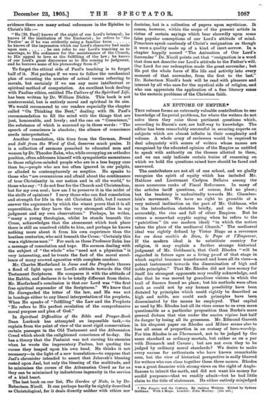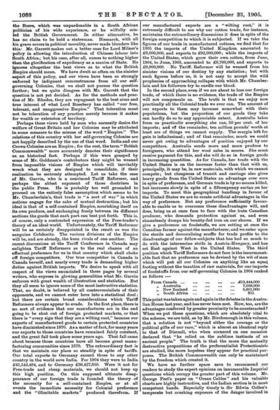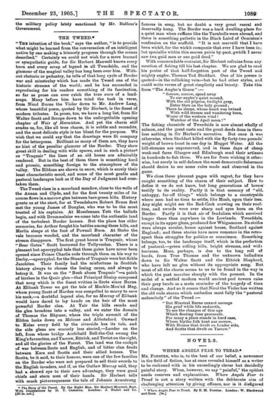THIS volume forms an extremely valuable contribution to our knowledge
of Imperial problems, for where the writers do not solve them they raise those pertinent questions which, according to Bacon's saw, are half-way to knowledge. The editor has been remarkably successful in securing experts on subjects which are almost infinite in their complexity and volume. A whole army of reviewers would be required to deal adequately with scores of writers whose names are recognised by the educated opinion of the Empire as entitled to speak with authority on the themes allotted to them; and we can only indicate certain trains of reasoning on which we bold the questions raised here should be faced and answered.
The contributors are not all of one school, and we gladly recognise the spirit of equity which has included Mr. Haldane and Lieutenant Carlyon Bellairs among the more numerous ranks of Fiscal Reformers. In many of the articles tariff questions, of course, find no place ; but the tendency is undoubtedly towards Mr. Chamber- lain's movement. We have no right to grumble at a very natural inclination on the part of Mr. Goldman, who in the introduction sketches briefly, and on the whole accurately, the rise and fall of other Empires. But he utters a somewhat cryptic saying when he refers to the "patriotism" (in our modern ideal) "in which the nation takes the place of the mediaeval Church." The mediaeval ideal was rightly defined by Victor Hugo as a reverence for ces deux ?noities de Dieu, le Pape et l'Empereur, If the modern ideal is to substitute country for religion, it may explain a further strange historical judgment of Mr. Goldman's, that Cecil Rhodes " will be regarded in future ages as a living proof of that stage in which capital becomes transformed and loses all its vices—a potent instrument towards the dissemination of high and noble principles." That Mr. Rhodes did not love money for itself his strongest opponents may readily acknowledge, and also that he was moved by grandiose visions in which the trail of finance found no place ; but his methods were often such as could not by any human possibility have been dictated by principles which could rightly be described as high and noble, nor could such principles have been disseminated by the means he employed. That capital as used by Mr. Rhodes lost all its vices seems to us even more questionable as a particular proposition than Burke's more general dictum that vice under the ancien, regime lost half its danger by losing all its grossness. Mr. Edmund Garrett in his eloquent paper on Rhodes and Milner seems also to lose all sense of proportion in an ecstasy of hero-worship. For him Rhodes is an Ubermensch, not to be judged by the same standard as ordinary mortals, but rather as on a par with Bismarck and Cavour ; but are not even they to he judged by ordinary moral standards ? We desire to make every excuse for enthusiasts who have known remarkable men, but the view of historical perspective is sadly blurred for writers who can class together these three names. Rhodes was a great financier with strong views on the right of Anglo- Saxons to inherit the earth, and did not want his money for sordid purposes—that we readily admit—but he had little claim to the title of statesman. He either entirely misjudged • The Empire and the Century. By various Writers. Edited by Sydney Goldman. With 4 Maps. London John Murray. p2ls net. J the Boers, which was unpardonable in a South African politician of his wide experience, or he wilfully mis- led the British Government. In either alternative, he has no claim to be held a statesman. Bismarck, with all his grave errors in political morality, never made blunders like this: Mr. Garrett makes out a better case for Lord Milner's policy in allowing the introduction of Chinese labour into South Africa; but his case, after all, comes to nothing higher than the glorification of expediency as a maxim of State. He ignores altogether the best views as to what the British Empire should mean. We have dwelt so often on the sinister aspect of this policy, and our views have been so strongly enforced by indignant remonstrances from all our self- governing Colonies, that we shall not pursue the question further; but we quite disagree with Mr. Garrett that the question is not yet decided. As for the methods and prac- tice of Mr. Rhodes, they are repugnant to the best aims and true interest of what Lord Rosebery has called "our free, tolerant, and unaggressive Empire." That toleration must not be toleration of any practice merely because it makes for wealth or extension of territory.
Perhaps these views held by men who earnestly desire the welfare of Great Britain and her Colonies may be attributed in some measure to the misuse of the word " Empire." The relations of this country with her self-governing Colonies are not happily described by the use of that word. India and our Crown Colonies are an Empire ; for the rest, the term " British Commonwealth" more accurately denotes their significance as an historical fact. Perhaps if this were grasped by some of Mr. Goldman's contributors they might be weaned from impossible visions of Empire which will inevitably wreck what they are designed to consolidate, if their realisation be seriously attempted. Let us take the case of Mr. Garvin, who is a convinced Tariff Reformer, and perhaps the ablest exponent of those doctrines in the public Press. He is probably too well grounded to proceed on the entirely false assumption which seems to be Mr. Chamberlain's, that trade is " a sort of war " in which nations engage for the sake of mutual destruction ; but his ideal is that of a self-contained Empire, nourishing itself on its own produce, and exchanging freely between its different sections the goods that each part can best put forth. This is, of course, only a contracted expression of the Free-trader's theory of an ideal world. Unfortunately, the Tariff Reformer will be as certainly disappointed in the result as was the sanguine Cobdenite. The various divisions of the Empire will be, and are already, the keen rivals of one another. The recent discussions at the Tariff Conference in Canada may enlighten Tariff Reformers as to the real chance of an effectual preference for us in that country which shall choke off foreign competitors. Our true competitor in Canada is Canada herself, and nearly every trade is demanding higher duties against British imports. We desire to speak with all respect of the views enunciated in these pages by several writers, who express in glowing generalities what Mr. Garvin enforces with great wealth of illustration and statistics. But they all seem to ignore some of the most instructive statistics. That, no doubt, is believed by all controversialists of their opponents, and we cannot enter here into a statistical duel ; but there are certain broad considerations which Tariff Reformers always appear to evade. In the first place, there is no sort of evidence that our manufactures are in the end going to be shut out of foreign protected markets, or that there is " every sign that they are a wilting root," because our exports of manufactured goods to certain protected countries have diminished since 1870. As a matter of fact, for many years our exports to those countries have remained fairly constant, and the great fall took place some years ago. That fall came about because those countries have all become great manu- facturing communities since 1870. The extraordinary fact is that we maintain our place so steadily in spite of tariffs. Our total exports to Germany exceed those to any other country in the world save India. For 1904 they were to India £41,544,494, and to Germany £36,427,850. Were it not for Free-trade and cheap materials, we should not keep up this high , position. On this supposed ultimate disap- pearance of our foreign trade is founded the theory of the necessity for a self-contained Empire, or at all events the immediate necessity for Colonial preference and the "illimitable markets" produced therefrom. If
our manufactured exports are a "wilting root," it is extremely difficult to see why our cotton trade, for instance, maintains the extraordinary dimensions it does in spite of the foreign competition to which it is subjected. If we take the figures of our trade in manufactured cottons, we find that for 1905 the imports of the United Kingdom. amounted to £8,000,000, and exports to £92,000,000; while the imports of the United States, which grow their own cotton, from June, 1904, to June, 1905, amounted to £9,700,000, and exports to £9,900,000. No Tariff: Reformer will be weaned from his sinister visions of our destiny by any statistics ; but with such figures before us, it is not easy to accept the, wild prophecies of approaching collapse with which Mr. Chamber. lain and his followers try to curdle our blood.
In the second place, even if we are about to lose our foreign trade, of which there is no evidence, the trade of the Empire will not compensate us. The truth is that we enjoy now practically all the Colonial trade we ever can. The amount of our exports to them may increase somewhat with their populations, but the proportion of our goods they take can hardly do so to any appreciable extent. Australia takes from us practically everything she can, 50 per cent. of her imports ; and of the remainder, ten million pounds' worth at least are of things we cannot supply. The margin left for gain is infinitesimal ; and of that remainder, much we could never get owing to advantages of position eujoyed by our competitors. Australia sends more and more produce to foreigners, who attend her wool sales in scores. She must receive payment for this, and she will do so in foreign goods in increasing quantities. As for Canada, her trade with the United States is on the increase faster than that with us, principally, it may be, in raw materials, with which we cannot compete ; but cheapness of transit and carriage also gives heavy goods from the United States an advantage over ours in spite of preference, and German trade is by no means killed, but increases slowly in spite of a fifteenpenny surtax on her imports. To meet this geographical handicap in favour of the United States we are to create artificial advantages in the way of preference. But any preference sufficiently favour- able to enable us to overcome these disadvantages will, and does, bring us at once face to face with the irate Canadian producer, who demands protection against us, and even shamelessly dumps his bounty-fed iron on our shores. If we give a preference on foodstuffs, we are setting at once the Canadian farmer against the manufacturer, and we enter upon the sterile and demoralising scuffle for trade profits to the disadvantage of our fellow-subjects that has had so much to do with the internecine strife in Austria-Hungary, and has set East against West in the United States. The third position which Tariff Reformers do not face is the insurmount- able fact that no preference can be devised by the wit of man which will put all our Colonies on anything like an equal footing without the taxation of raw materials, for our imports of foodstuffs from our self-governing Colonies in 1904 ranked as follows :—
From Canada ... ••• ••• £13,444,000 „ Australia ••• ... 7,058,000 „ New Zealand ... ... 5,601,000 „ South Africa ••• Nil.
This point was taken again and again in the debates in the Austra- lian House last year, and has never been met. How, too, are the advantages conferred by greater proximity to be counteracted? When we put these questions, which are absolutely vital to the scheme, we are told, as by Mr. Birchenough in this volume, that a solution is not "beyond either the courage or the political gifts of our race," which is almost an identical reply to that of Disraeli, who when cornered on one occasion declared that "he relied on the sublime instincts of an ancient people." The truth is that the more the mutually destructive propositions of the preferentialist Protectionists are studied, the more hopeless they appear for practical pur- poses. The British Commonwealth can only be maintained by the freedom which created it.
We have no further space save to recommend our readers to study the expert opinions on innumerable Imperial questions which occupy the greater part of this volume. Mr. George Peel's paper on " Ocean Cables " and his valuible charts are highly instructive, and the Indian section is in most competent hands. Especially timely is. Sir Edwin Collen's temperate but crushing exposure of the danger involved in THE TWEED.*








































 Previous page
Previous page